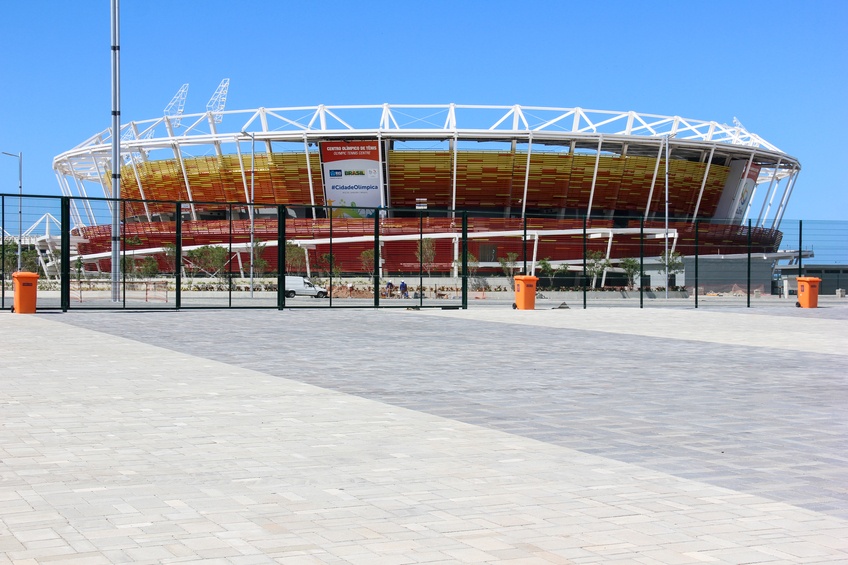 A gold medal is arguably one of the greatest rewards athletes can earn in their careers. Many individuals have gone to great lengths to achieve this esteemed prize, embodying the phrase “with great risk comes great reward.” The 2016 Summer Olympics are just a few short weeks away and this year, the reverse “with great reward comes great risk” rings just as true.
A gold medal is arguably one of the greatest rewards athletes can earn in their careers. Many individuals have gone to great lengths to achieve this esteemed prize, embodying the phrase “with great risk comes great reward.” The 2016 Summer Olympics are just a few short weeks away and this year, the reverse “with great reward comes great risk” rings just as true.
Risk is at the forefront of this summer’s games due to Rio de Janeiro’s unnervingly high crime rates and various disease epidemics. The usual risks that accompany any large event are amplified by the current state of the city. In order to combat any potential dangers, insurance has become more important than ever. Preparing for more than 16,000 athletes and approximately 600,000 visitors in addition to the city’s 6.2 million inhabitants has resulted in the most heavily insured games in history. From start to finish, insurance will play an integral part in the overall success of the Olympics.
Hosting the Games: A Hot Pursuit
Hosting the Olympics is an honor sought by a number of cities around the globe. In reality, the competition at the Olympics starts well before the games begin as cities compete to host. What you may not realize is that a bid to host the games requires years of careful and precise planning. Estimations of insurance coverage make up a large portion of the cities’ proposals. Generally, there are three categories where cities expect to need coverage:
 Construction Insurance: Athletes will be competing in 28 different sports at this year’s Olympic Games. To accommodate each event, Rio is has constructed 18 new venues. As part of the construction bid process contractors are required to purchase insurance to guarantee financing and completion of athletic and non-athletic venues. The insurance costs differ based on contractors chosen, but can amount to more than $100 million.
Construction Insurance: Athletes will be competing in 28 different sports at this year’s Olympic Games. To accommodate each event, Rio is has constructed 18 new venues. As part of the construction bid process contractors are required to purchase insurance to guarantee financing and completion of athletic and non-athletic venues. The insurance costs differ based on contractors chosen, but can amount to more than $100 million. Private Developer Insurance: In order to manage the monumental risk that accompanies a major construction and infrastructure project such as the Olympic Games, contractors must purchase six unique types of insurance plans. Some of these plans include surety and performance bonds, liability insurance, builders’ risk insurance and bid bonds. Each plan protects contractors from different types of ‘what if’ situations from damage to people or property during the construction to overrun costs throughout the build. In recent games, the average cost of construction insurance has totaled $250 million.
Organizing Committee for the Olympic Games’ (OCOG) Insurance: The big ticket item in terms of insurance costs for this summer’s games is the plan purchased by Rio to offset the OCOG’s potential risk of revenue short falls. The main area of concern this year is potential losses in ticketing revenues due to event cancellation. The details of this cancellation insurance policy include $400 million in coverage if organizers fail to fill seats. An additional $900 million policy has been placed on first loss basis should the games be cancelled and covers potential liabilities arising from the loss of revenue from broadcast rights and global media transmission costs.
A Risky Road to Rio The location of this years’ games has created a number of unique challenges including transportation. Due to growing concerns regarding the Zika virus and the city’s present crime wave, travel insurance sales are at an all-time high. Insurers that had previously estimated sales increases of 13 to 15 percent due to the Olympic Games are instead reporting increases of nearly 60 percent.
The location of this years’ games has created a number of unique challenges including transportation. Due to growing concerns regarding the Zika virus and the city’s present crime wave, travel insurance sales are at an all-time high. Insurers that had previously estimated sales increases of 13 to 15 percent due to the Olympic Games are instead reporting increases of nearly 60 percent.
In addition to travel insurance, many event goers are being urged to consider purchasing a wide-range of insurance products. This includes health policies covering medical treatment for accidents, injuries and illnesses, as well as emergency medical evacuation coverage for situations where the local medical facilities are overwhelmed or unable to provide adequate care. Additional areas of focus include baggage coverage for luggage and personal effects that could be destroyed or delayed due to travel slowdowns and repatriation coverage for remains, in the case of a worst-possible scenario.
Protecting the Athletes
 Insurance is not just limited to the games themselves. In fact, today’s Olympic athletes are often covered by insurance policies. With daily training regimens that often entail pushing one’s body to the limit—and sometimes beyond—athletes need assurances that any damage they may be doing is covered.
Insurance is not just limited to the games themselves. In fact, today’s Olympic athletes are often covered by insurance policies. With daily training regimens that often entail pushing one’s body to the limit—and sometimes beyond—athletes need assurances that any damage they may be doing is covered.
For members of Team U.S.A., peace of mind comes from the U.S. Olympic Committee (USOC). Through the USOC, athletes are provided access to full health insurance coverage during the games.
Unfortunately, the job of an Olympic athlete is extremely high risk and the USOC has a very limited budget to fully cover every team member year round. As a result, many athletes have sought out health insurance in exchange for sponsorship. Kristen Thomas, a member of the women’s rugby team; Madison Hughes, a member of the men’s rugby team; Brad Snyder, a Paralympian para-swimmer; and the entire U.S. rowing team have pursued outside coverage to support them during their Olympic training.
An Award Worth Protecting
Just because they have won an Olympic medal doesn’t mean the winners can breathe a sigh of relief. First they need to ensure their recently achieved prize is covered. Up until the 2014 Sochi Olympics, medals were rewarded with no form of insurance. Unfortunately, there have been a surprising number of “misplaced” medals reported throughout the history of the games including snowboarder Shaun White, Dutch rower Diederik Simon, Italian rower Davide Tizzano, and skeleton-racing champion Tristan Gale. Replacement medals generally cost between $500 and $1,200 and are labeled with the word ‘replica’—a stark reminder of what has been lost.
 This summer, however, winners will take home their prizes with a little more reassurance. Liberty Mutual, the “Official Protection Partner of Team USA Olympic Medals,” will be providing coverage for all medals through 2020. As a result, athletes who lose or damage their priceless medal will be able to replace it at no cost. Although the medals’ extrinsic value can never fully be replaced, insurers are dedicated to providing Olympic medalists with a sense of comfort.
This summer, however, winners will take home their prizes with a little more reassurance. Liberty Mutual, the “Official Protection Partner of Team USA Olympic Medals,” will be providing coverage for all medals through 2020. As a result, athletes who lose or damage their priceless medal will be able to replace it at no cost. Although the medals’ extrinsic value can never fully be replaced, insurers are dedicated to providing Olympic medalists with a sense of comfort.
Preparing for the worst to ensure the best possible outcome is the key to any event’s success. All in all, the 2016 Summer Games has estimated more than $2 billion worth of potential risks. Managing this astronomical total includes years of in-depth planning and preparation along with the heavy involvement of insurance. While most people do not typically regard insurance as a player in the games, it is now very apparent the vital contribution it makes.
 Construction Insurance: Athletes will be competing in 28 different sports at this year’s Olympic Games. To accommodate each event, Rio is has constructed 18 new venues. As part of the construction bid process contractors are required to purchase insurance to guarantee financing and completion of athletic and non-athletic venues. The insurance costs differ based on contractors chosen, but can amount to more than $100 million.
Construction Insurance: Athletes will be competing in 28 different sports at this year’s Olympic Games. To accommodate each event, Rio is has constructed 18 new venues. As part of the construction bid process contractors are required to purchase insurance to guarantee financing and completion of athletic and non-athletic venues. The insurance costs differ based on contractors chosen, but can amount to more than $100 million.